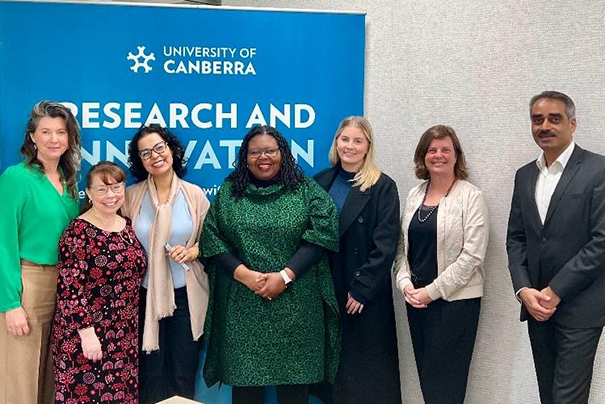University of Canberra Launches Pioneering Research for Development Network, Leading Global Development Initiatives
The University of Canberra recently launched the UC Research for Development Network (UCR4D), a cross-faculty initiative to address pressing global issues, including climate change adaptation, food security, international development and reducing inequalities.
The network connects researchers from different disciplines – economics, gender studies, education, arts, policy, water management and more – to collaborate, share funding initiatives, and raise the profile of development research at the University.
“In development research, a lot of the work requires an inter-, multi- or transdisciplinary approach, and the network will facilitate a way to connect with UC experts,” said the initiator of UCR4D, Associate Professor Leonie Pearson from the Centre for Environmental Governance (CEG) in the Faculty of Business, Government and Law.
She explains that UCR4D was established to facilitate knowledge-sharing between development researchers – particularly early career researchers. “The idea is to invite people to share our news and knowledge, but also to show us where and how we can design better research outcomes and drive better impacts for the work that we already do.”
“The network is a great initiative to connect researchers across the University,” said Professor Katharine McKinnon, who is part of the Livelihoods and Learning for Sustainable Communities research group in the Centre for Sustainable Communities (CSC), based in the Faculty of Education.
“At the CSC, we have a well-established record in the development space, and the network provides a great platform to build stronger collaborations with academics in other faculties. Building a stronger research community in this field across the wider university can only be of benefit.”
Fellow CSC researcher Dr Ann Hill, who has led interdisciplinary research projects on growing community food economies for more than a decade, said that UC4RD provides an exciting opportunity to expand support for research students, academics and Asia Pacific communities.
“Our research in the CSC works to bring traditional and Indigenous knowledge to the surface – and to value it. This network can help strengthen our resolve to partner effectively with grassroots initiatives.”
UC4RD’s academics are experts in sustainable development, specialising in the Asia and Oceania regions. Their portfolio of research projects has spanned more than ten years and 20 countries, funded by organisations such as the Australian Centre for International Agricultural Research (ACIAR), Department of Foreign Affairs and Trade (DFAT) and CGIAR, a global research partnership dedicated to a food-secure future.
Several of Associate Professor Pearson’s research projects have focused on the Mekong River region in East Asia and Southeast Asia.
“I’m currently working with the DFAT-funded Mekong Thought Leaders think tank, which looks at the nexus between environment, water and climate change across the Mekong. We’re working with local academics and policy-makers, in order to upskill and to create new knowledge on how to tackle some of the biggest issues,” she said.
Another of her current projects is funded by ACIAR and looks at the future of smallholder farmers in Vietnam in the year 2050, for the purposes of designing better policies now to develop the skills farmers will need in the future.
Dr Jane Alver, a fellow CEG researcher in UCR4D. is conducting a project that aims to reframe the response to climate change in the Pacific Islands from a more inclusive perspective.
“The idea is to get a Pasifika-led elicitation of guiding principles to give to organisations like ACIAR or DFAT. We are interviewing people who have diverse sexualities or gender identities, people with disability, and others whose specific needs might not be accounted for in climate programming, and using methodologies such as talanoa to listen [a Pasifika term referring to inclusive, participatory and transparent dialogue].
“By doing this, we can identify where people are missing out, and co-create suggestions for a more intersectional inclusion.”
CSC researchers are currently engaged in projects aimed at improving local livelihoods through a community-led approach in Pakistan, Papua New Guinea, the Solomon Islands, Cambodia and Timor Leste, on issues such as gender equity in farming communities and livelihood innovations for artisanal fishers. A key example is Dr Sandra Heaney-Mustafa ‘Farmers and Co-researchers’ project in Pakistan, for which she is developing a model for to farmers to lead research into adaptation strategies for salinity-affected land in the southern Indus Basin.
On 16 August, UC4RD researchers met with Dr Ismahane Elouafi, Executive Managing Director of CGIAR, to explore exciting partnership opportunities. The discussion focused on key areas of mutual interest, including climate change adaptation, gender equality, reducing inequalities, nutrition and food security, genotype research, and capacity building and training. The meeting marked a significant step towards collaborative research with CGIAR.
The network is collaborating with other University groups in the planning stages of a UC4RD workshop for cross-faculty and external development researchers, and further workshops and forums are also on the horizon.
UC4RD invites development researchers, including current and future HDR students, to connect with the network and join efforts to drive innovation and impact in development research.
“We want to let the outside world know what we’re doing. The University is a great place to study and carry out research into international development,” said Dr Alver.

